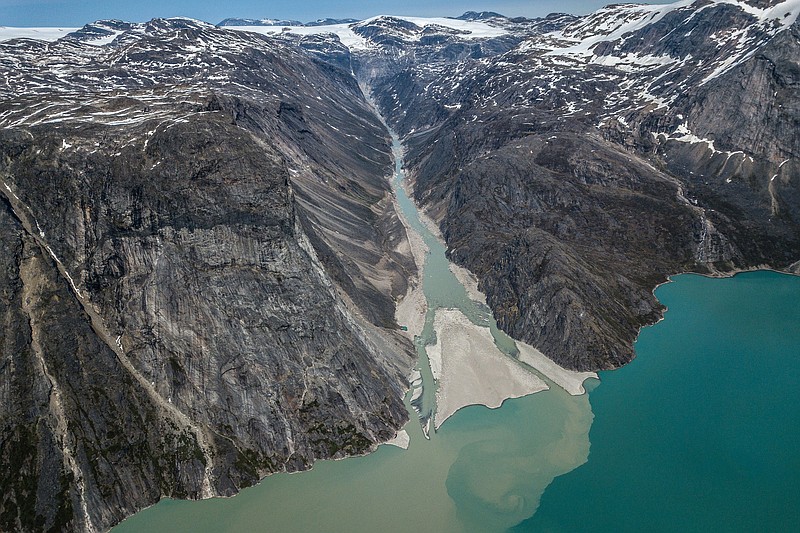If you saw last week's story about Greenland's melting ice sheet releasing not just water, but also sediment, and laughed aloud when you read that some were questioning the appropriateness of the island capitalizing on it, you were not alone.
It seems there is a global demand for sand, and the sediment being left behind as ice melts could help Greenland's economic future. And why shouldn't it? Could Greenland, population 57,000, become a provider of sand to billions of people? Sand for eroded beaches. Sand as bedding for pipes, cables and other underground infrastructure. Sand for concrete levees to shield land and homes from rising seas.
With climate change accelerating the melting of Greenland's mile-thick ice sheet - a recent study found that melting has increased sixfold since the 1980s - there is going to be a lot more, according to The New York Times.
You may also have read about record-breaking heat across both Europe and Alaska. "Baked Alaska" was the Guardian's headline. Anchorage experienced higher-than-average temperatures nearly every day of June, reaching 80 degrees on days that once maxed out at 67. It may seem balmy to us as we suffer through a spate of early summer 90s, but in dry Alaska, the heat is torching nearly 120 uncontained wildfires.
University of Alaska climate specialist Rick Thoman explains that our northernmost state is trapped in a kind of "hot feedback loop," as the Arctic is heating up much faster than the rest of the planet. Ocean surface temperatures upward of 10 degrees hotter than average have helped warm up the state's coasts, and that in turn is causing the Bering and Chukchi sea ice to collapse and melt months earlier than normal this spring. The combination is normalizing mass mortality events of sea birds and marine life, he said.
"I intentionally try to not be hyperbolic, but what do you say when there's 10- to 20- degree ocean water temperature above normal?" Thoman told the Guardian. "How else do you describe that besides extraordinary? The folks in the communities are saying these animals look like they've starved to death."
Meanwhile, it has been the hottest June since 1880 in Europe and around the world, according to the European Union's Copernicus Climate Change Service. The heat has broken temperature records in France, Switzerland, Austria, Germany and Spain.
But what are we talking about over here in the continental United States? Answer: Whether an Alabama woman shot in the belly should be prosecuted for her fetus' death because she started the argument that led to the shooting. How many Latin American men, women and children crammed into a cage or cell over its capacity on our Southern border is too many. Which Democratic candidates will raise the most money.
Here's an idea. Why don't we talk about how to stop, how to survive - and even how to profit from - climate change. There will be winners and losers. Maybe the winners can help the losers.
Democratic presidential candidate Pete Buttigieg last week proposed national service programs for climate change and mental health. That's a great start.
Some of the candidates have said they support the Green New Deal legislation.
On Wednesday, Mother Jones reported that 19 of the 25 Democratic presidential candidates have gone on record in favor of holding a debate devoted to climate change policy. That's another great idea, and the magazine noted:
"In the past three days, four more candidates - including Kamala Harris - have told Mother Jones that they support a climate debate, raising the stakes for the Democratic National Committee, which has so far resisted allowing such an event to take place. In addition to the California senator, New York City Mayor Bill de Blasio, former Rep. John Delaney of Maryland, and former Rep. Joe Sestak of Pennsylvania are now calling for a climate debate, joining big-name candidates including Joe Biden, Bernie Sanders, and Elizabeth Warren.
According to a Yale survey conducted last December, 70% of Americans are "worried" about climate change, 29% are "very worried" and 51% feel "helpless."
That worry and feeling of helplessness about climate is getting a new name - eco-anxiety, defined by the American Psychological Association as "a chronic fear of environmental doom."
Everyone is noticing - whether they want to admit it or not - that climate needs to be an immediate topic of conversation. Everyone, that is, except our government, our political party chairs and our Congress.
Let's make them join the conversation.
